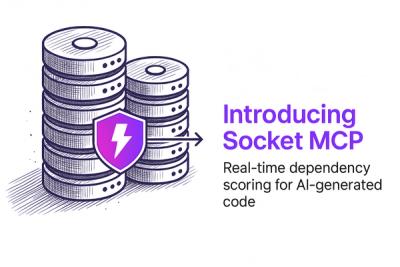
Product
Secure Your AI-Generated Code with Socket MCP
Socket MCP brings real-time security checks to AI-generated code, helping developers catch risky dependencies before they enter the codebase.

Dependency Injection library for Node.js.
The Spur Framework is a collection of commonly used Node.JS libraries used to create common application types with shared libraries.
Visit NPMJS.org for a full list of Spur Framework libraries >>
Inversion of Control (IoC) is also known as Dependency Injection (DI). IoC is a pattern in which objects define their external dependencies through constructor arguments or the use of a container factory. In short, the dependency is pushed to the class from the outside. All that means is that you shouldn't instantiate dependencies from inside the class.
Inversion of control is used to increase modularity of the program and make it extensible, and has applications in object-oriented programming and other programming paradigms.
It allows for the creation of cleaner and more modular code that is easier to develop, test and maintain:
$ npm install spur-ioc --save
Here is a quick example that sets up the definition of an injector, some dependencies and a startup script.
src/injector.jsconst spur = require('spur-ioc');
module.exports = function(){
// define a new injector
const ioc = spur.create('demo');
//register external dependencies or globals
ioc.registerDependencies({
'_' : require('underscore'),
'path' : require('path'),
'console' : console,
'nodeProcess' : process
});
// register folders in your project to be auto-injected
ioc.registerFolders(__dirname, [
'demo'
]);
return ioc;
}
src/demo/Tasks.jsExample of file that depends on an injectable dependency. This example shows the usage of underscore (_).
module.exports = function(_){
return _.map([1,2,3], function(num) {
return 'Task ' + num;
});
}
src/demo/TasksPrinter.jsThis example injects Tasks and console dependencies, both previously defined in the injector.
module.exports = function(Tasks, console){
return {
print: function(){
console.log(Tasks);
}
};
}
src/start.js (top declaration file)Example of how to create an instance of the injector and start the app by using one of its dependencies.
const injector = require('./injector');
injector().inject(function(TasksPrinter){
TasksPrinter.print();
});
While it is tempting to utilize the fat arrow syntax in this top declaration file like the example below, it will not be supported by spur-ioc. For more information, read issue #26. Instead use the recommended approach above. There isn't a compelling reason to add that additional support. If you use this style, it will break as the report in issue #26.
const injector = require('./injector');
injector().inject((TasksPrinter) => {
TasksPrinter.print();
});
Dependency injection really improves the ease of testing, removes reliance on global constiables and allows you to intercept seams and make dependencies friendly.
test/unit/TasksPrinterSpec.jsconst injector = require('../../src/Injector');
describe('TasksPrinter', () => {
beforeEach(function () {
this.mockConsole = {
logs:[],
log: () => this.logs.push(arguments)
};
// below we replace the console dependency silently
injector()
.addDependency('console', this.mockConsole, true)
.inject((TasksPrinter) => {
this.TasksPrinter = TasksPrinter;
});
});
it('should exist', function () {
expect(this.TasksPrinter).to.exist;
});
it('should greet correctly', function () {
this.TasksPrinter.print();
expect(this.mockConsole.logs[0][0]).to.deep.equal([
'Task 1', 'Task 2', 'Task 3'
]);
});
});
One of the great things about ioc is that you get real application dependency errors upfront at the start of your application.
module.exports = function (TaskZ, console) {
//...
}
// Produces:
// ERROR Missing Dependency TaskZ in $$demo -> TasksPrinter -> TaskZ
module.exports = function (_, TasksPrinter) {
//...
}
// Produces:
// ERROR Cyclic Dependency TasksPrinter in $$demo -> TasksPrinter -> Tasks -> TasksPrinter
Please send in pull requests and they will be reviewed in a timely manner. Please review this generic guide to submitting a good pull requests. The only things we ask in addition are the following:
The majority of the settings are controlled using an EditorConfig configuration file. To use it please download a plugin for your editor of choice.
Lint source code by running npm run lint.
To run the test suite, first install the dependancies, then run npm test
$ npm install
$ npm test
FAQs
Dependency Injection library for Node.js
The npm package spur-ioc receives a total of 53 weekly downloads. As such, spur-ioc popularity was classified as not popular.
We found that spur-ioc demonstrated a not healthy version release cadence and project activity because the last version was released a year ago. It has 2 open source maintainers collaborating on the project.
Did you know?

Socket for GitHub automatically highlights issues in each pull request and monitors the health of all your open source dependencies. Discover the contents of your packages and block harmful activity before you install or update your dependencies.

Product
Socket MCP brings real-time security checks to AI-generated code, helping developers catch risky dependencies before they enter the codebase.

Security News
As vulnerability data bottlenecks grow, the federal government is formally investigating NIST’s handling of the National Vulnerability Database.

Research
Security News
Socket’s Threat Research Team has uncovered 60 npm packages using post-install scripts to silently exfiltrate hostnames, IP addresses, DNS servers, and user directories to a Discord-controlled endpoint.